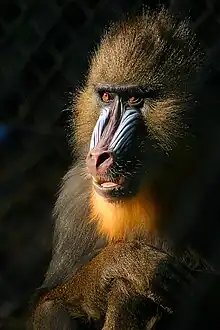mandrill
English

A mandrill
Etymology
man + [[drill#Etymology 5|drill|drill]] (“Mandrillus leucophaeus”).
Pronunciation
- IPA(key): /ˈmæn.dɹɪl/
Audio (Southern England) (file)
- Homophone: mandril
Noun
mandrill (plural mandrills)
- A primate, Mandrillus sphinx, with colorful face and rump.
- 1865, John George Wood, The Illustrated Natural History: Mammalia, George Routledge and Sons, page 76:
- For the Mandrills live in society, and their bands are so powerful in point of numbers, and so crafty in point of management, that they are about as formidable neighbours as could be imagined.
- 1999, John G. Fleagle, Primate Adaptation and Evolution, 2nd edition, Elsevier (Academic Press), page 200:
- In both mandrills and drills, males have long muzzles with pronounced maxillary ridges and long tooth rows. Like baboons, mandrills and drills have forelimbs and hindlimbs of nearly equal length.
- 2003, Alan Dixson, Nancy Harvey, Marilyn Patton, Joanna Setchell, “2: Behaviour and reproduction”, in William V. Holt, Amanda R. Pickard, John C. Rodger, David E. Wildt, editors, Reproductive Science and Integrated Conservation, Cambridge University Press, page 26:
- Mandrills occur in Gabon, Congo, Rio Muni and in Cameroon, to the south of the Sanaga River.
Translations
Mandrillus sphinx
|
French
Pronunciation
Audio (Paris) (file) Audio (Switzerland) (file)
Further reading
- “mandrill”, in Trésor de la langue française informatisé [Digitized Treasury of the French Language], 2012.
This article is issued from Wiktionary. The text is licensed under Creative Commons - Attribution - Sharealike. Additional terms may apply for the media files.